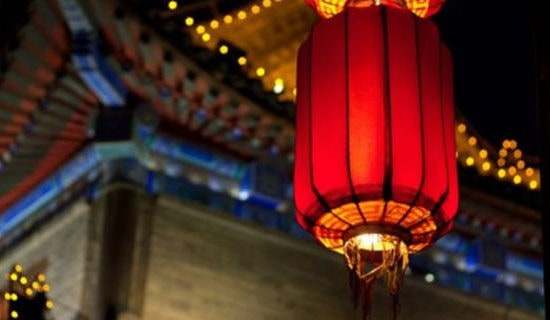春节的起源英语版
春节对于中国人来说是最重要的节日。在每年的春节都让人兴高采烈,尤其是大年三十那晚,更是达到了高潮。下面小编为你整理了春节的起源英语版,希望能帮到你!

春节的起源英语版(1)
Spring Festival originated in Shang period
It is said that "Spring Festival" originated from the sacrificial offering of ancestors worshiping the ancestors (wax sacrifice) at the beginning of the year of the Shang dynasty in China. In the early years of the Western Zhou Dynasty, the custom of celebrating harvests and sacrificing ancestors once a year at the intervals between the new years and the old ones can be regarded as the prototype of "Year." However, the name "Year" appeared later, with the name of the year starting from the Zhou Dynasty. Ancient emperors ascended the throne, in order to show the "emperor" authority, often self-reliance calendar.
Years of time to the Western Han Dynasty was officially fixed, has been extended to today. Han Emperor Wu (140 BC ~ 87 BC) succeeded him and decided to rebuild the calendar to make it uniform. Si Maqian suggested creating the first calendar and setting the Spring Festival in the first month of Meng Chun. Today, the calendar we adopted was revised by several dynasties after the Han Emperor Wu of the Han Dynasty. However, as the most solemn festival of the Chinese nation, the New Year's Day, the first day of the first lunar month, is followed by a fixed day.
春节起源于殷商时期
有说“春节”起源于中国殷商时期年头岁尾的祭神祭祖活动(腊祭)。西周初年已有了一年一度在新旧岁交替之际庆祝丰收和祭祀祖先的风俗活动,可以认为是“年”的雏形。但“年”的名称出现却较晚,年的`名称是从周朝开始的。古代帝王继位,为了显示“天子”的权威,往往自立历法。
年的时间到了西汉才正式固定下来,一直延续到今天。汉武帝(公元前140年~前87年)继位,决定重修历法使之统一,司马迁建议创立了太初历,把春节定在孟春正月。今日我们所采用的历法是汉武帝以后,经过多个朝代修定的,但农历正月初一为“元旦”的年节作为中华民族最隆重的节日,以固定的日子沿袭下来。
春节的起源英语版(2)
Spring Festival and the concept of the year, the initial meaning from agriculture, the ancient people called the valley's growth cycle "year", "said the text. Wo Division ":" Valley of ripening: also produced in the Xia and Xia Dynasties calendar, the moon is missing the cycle of months, a year is divided into twelve months a month to see the moon on the day of the new moon, the New Moon Of the child called the first year, that is, the beginning of the year, also known as the year, the name of the year from the Zhou Dynasty, until the Western Han Dynasty was officially fixed until today, but the first day of the first lunar month is said As New Year's Day, until the victory of the Chinese Revolution of 1911, the Provisional Government of Nanjing stipulated that the calendar year should be used by the people in order to comply with the agricultural time and to facilitate the statistics. The official calendar should be implemented in government agencies, factories and mines, schools and groups. New Year's Day, lunar January first lunar new year.
On September 27, 1949, New China was established. At the first plenary session of the Chinese People's Political Consultative Conference, the calendar year of the Gregorian calendar was adopted as the New Year's Day, which was commonly known as the Gregorian calendar. The lunar calendar The first day of the first lunar month is usually before and after the beginning of spring, so the first lunar month must be designated as the "Spring Festival," commonly known as the lunar year.
The Spring Festival in the traditional sense refers to the wax festival from the eighth day of the twelfth lunar month or the sacrificial oven of the twelfth lunar month until the fifteenth day of the lunar January, with the climax of the New Year's Eve and the first day of the first lunar month. During the traditional festival of the Spring Festival, all the Han and most minorities in our country have to hold various celebrations. Most of these activities include sacrificing worship to the gods and Buddha and sacrificing their ancestors. Activities in a colorful, with rich ethnic characteristics.
春节和年的概念,最初的含意来自农业,古时人们把谷的生长周期称为“年”,《说文。禾部》:“年,谷熟也:。在夏商时代产生了夏历,以月亮圆缺的周期为月,一年划分为十二个月,每月以不见月亮的那天为朔,正月朔日的子时称为岁首,即一年的开始,也叫年,年的名称是从周朝开始的,至了西汉才正式固定下来,一直延续到今天。但古时的正月初一被称为“元旦”,直到中国近代辛亥革命胜利后,南京临时政府为了顺应农时和便于统计,规定在民间使用夏历,在政府机关、厂矿、学校和团体中实行公历,以公历的元月一日为元旦,农历的正月初一称春节。
1949年9月27日,新中国成立,在中国人民政治协商会议第一届全体会议上,通过了使用世界上通用的公历纪元,把公历的元月一日定为元旦,俗称阳历年;农历正月初一通常都在立春前后,因而把农历正月初一定为“春节”,俗称阴历年。
传统意义上的春节是指从腊月初八的腊祭或腊月二十三的祭灶,一直到正月十五,其中以除夕和正月初一为高潮。在春节这一传统节日期间,我国的汉族和大多数少数民族都有要举行各种庆祝活动,这些活动大多以祭祀神佛、祭奠祖先、除旧布新、迎禧接福、祈求丰年为主要内容。活动形式丰富多彩,带有浓郁的民族特色。
【春节的起源英语版】相关文章:
春节手抄报英语版12-02
手抄报资料:春节的起源及由来08-08
元旦的习俗英语版09-27
英语版的名言警句06-26
英语版的励志名言01-12
粽子的起源08-12
粤语的起源09-13
有关友谊的名言英语版11-16
英语版的个人简历08-23
英语版小笑话07-27